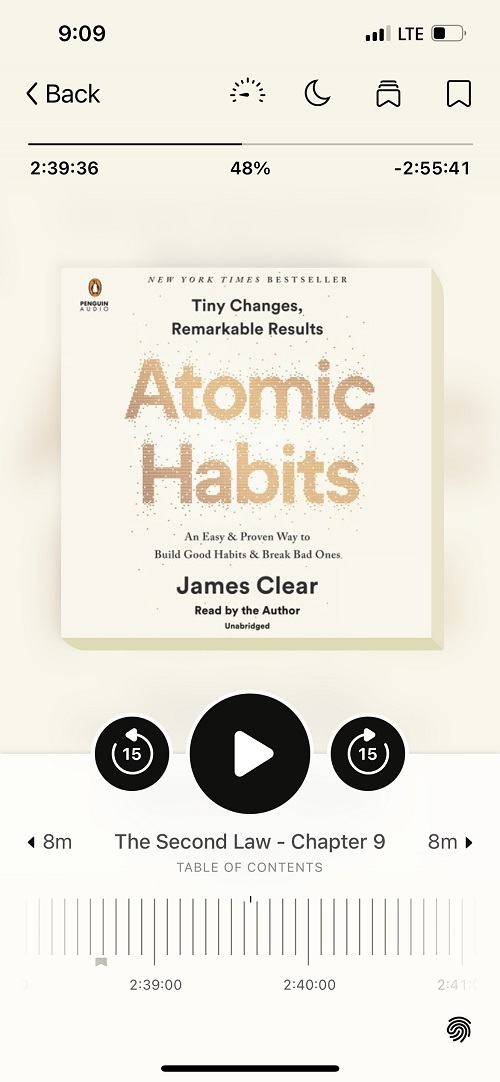
Book Review- Atomic Habits
Okay guys, I know 2023 just started, but hear me out: I’m pretty sure I already found my favorite book for this year. Don’t worry, I’ll keep reading all year, just to make sure.
Atomic Habits by James Clear is one of those books that left me feeling so inspired! I listened to the audiobook vs reading a paper copy, and I almost think that it made it even better! I mean, two exclamation point sentences in a row. Come on. It’s gotta be good! The author jumps right in, starting the book off with a story about an injury that could have totally derailed his life, and how it affected him. It was enough to make me re-think my kids playing sports, but it also got me into a mindset of looking for ways to overcome whatever challenges (excuses?) I think I have in my life as to why I can’t build habits that will get my life on the track I want it to be on.
I don’t want to give away too many of the tactics in the book, but I’m going to mention a few that really stuck out to me. One was “the aggregation of marginal gains”, a concept that the author attributes to a cycling coach named Dave Brailsford. Basically, if you look for tiny margins of improvement in the little parts of something, in this case cycling, you’ll see major improvements when you put them all together. A 1% improvement every day ends up as 37 times better in one year. I didn’t check his math; I’m not about that life. But it makes sense. “Success is the product of daily habits, not once in a lifetime transformations.”
Another mindset shift for me was outcome based habits vs. identity based habits. When you build habits based around what you want to achieve, say, losing 20 pounds or learning to play guitar, you ignore how the beliefs that built your current identity may counteract those goals. “What you do is a reflection of the type person you believe you are, either consciously or unconsciously.” I have never been one for diets. I mean, really, I’ve never been one to care what I eat. I want it to be easy and I want it to taste good, and it’s been a weird point of pride for me that I basically eat whatever I want and stay around the same clothing size. Why this matters, I have no idea. But listening to this book, I realized that my “diet”, or lack thereof, has sneakily become part of my identity. My gym is running a nutrition challenge right now, and I signed up. What can I say, it was a moment of weakness. But when I signed up, in the back of my mind, I had already decided I couldn’t do it. My brain told me “I don’t count my calories, I don’t even know what macros are, and any points I add to my team’s total are going to be a fluke.” But in the three weeks we’ve been doing the challenge, and after listening to this chapter, I started thinking “what would a healthy eater pack for lunch?” I want my family to be healthy. I want to stay active and keep up with my kids, and shifting my identity to a (80/20, at least) healthy eater has proven much more effective than trying to stick to some sort of prescribed diet plan.
The last thing I’ll mention is habit stacking. One of my sisters-in-law mentioned a way that she does this a few weeks ago, and it’s stuck with me. Every morning while she’s stretching, she reads her Bible. Simple, but effective. She said that if she doesn’t stretch, she’s sore during the day, which makes it a great way to ensure she also starts her day reading the Bible (another habit that’s important to her). Habit stacking is exactly what it sounds like: adding a habit you’d like to start into the routine of an existing habit. Along with the example I just gave, it could be something like prepping your kid’s school lunch while you’re making dinner, wiping down the toilet and sink before you get in the shower, or doing 3 stretches after brushing your teeth every night.
Oh! One more thing I’ll mention. Because this book is a literal treasure trove and I can’t stop talking about it. The author mentions the Goldilocks Rule: humans are the most productive when they’re operating at 4% above their current level of ability. Not too hard, not too easy, but a “just right” level of difficulty. *Cue the 3 bears wandering in* If your task is too easy, you’ll get bored. If it’s too hard, you’ll get discouraged. But if it’s right above where you’re currently able to perform, it’s easier for you to see small increments of progress and stay motivated to keep after the goal.
Okay, now I’m done. But you shouldn’t be. You should absolutely be on your way to the library, Barnes & Noble, Amazon, or better yet, your local mom and pop bookstore to add Atomic Habits to your collection. And grab a cute notebook while you’re there, ’cause you’re gonna want to take notes.

